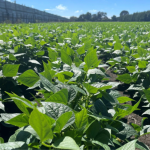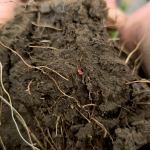Australia's lead in soil carbon credits - A climate action advantage New Zealand could embrace
Added 2 years ago
By Hawke's Bay Future Farming Trust

As September 2022 draws to a close, marking the conclusion of New Zealand's warmest winter on record, attention turns to an unexpected climate change battleground: soil. Guy Hudson, CEO of agricultural start-up Loam Bio, is in central Sydney, showcasing Australia's unique strategy in combating climate change through soil carbon sequestration.
Hudson, sitting on a park bench, highlights an ordinary-looking slice of Australian soil, emphasizing that, to him, all soil holds potential. Loam Bio's innovative approach involves a fungal seed coating, enhancing plants' carbon absorption capabilities and proving successful in entering the carbon market.
In Australia, soil carbon isn't just a climate solution; it's a cash crop. The Clean Energy Regulator has registered over 400 soil carbon projects eligible for carbon credits, offering farmers financial incentives for practices like converting land to permanent pasture or improving pasture management.
New Zealand's Missing Scheme? Despite having higher average soil carbon levels, New Zealand lacks a similar soil carbon credit scheme. While the nation typically considers itself ahead in climate action, Australia's focus on soil carbon as a valuable resource challenges this perception.
Soil carbon, often overshadowed by emissions from cars and factories, holds significant potential as a climate solution. Experts argue that increasing soil carbon can buy time for countries to address carbon dioxide emissions. New Zealand researchers believe that a 1% annual increase in soil carbon under pasture could temporarily offset the country's entire fossil fuel emissions.
Australia's embrace of soil carbon credits is not without challenges. Former Prime Minister Scott Morrison's ambitious plan faced criticism, and there are ongoing debates about credit values. However, Australia's extensive tracts of cultivated and often depleted soil provide ample room for improvement, giving farmers an advantage.
To replicate Australia's success, New Zealand would need evidence tailored to its conditions. Current research initiatives, such as a comprehensive soil carbon test, aim to gather crucial data. Challenges include determining the efficacy of different management practices and ensuring that carbon storage is both reliable and economically viable.
Australia's soil carbon strategy offers a unique pathway for climate action. New Zealand's potential involvement hinges on scientific evidence and adaptation of successful practices. As research progresses, soil carbon may emerge as a valuable asset, providing farmers with a new revenue stream and contributing to global climate efforts.
Be the first to leave a comment.
Leave a comment
All comments are reviewed before they are published on the website. Your email address will not be published.

Carbon Positive Trial Update – February 2025

Carbon Positive Update

Community Engagement and Knowledge Sharing Strengthen the Carbon Positive Project

Are We Changing Soil Carbon Yet? Three Years In, the Jury’s Still Out

Farewell to Trustee Phil Schofield – A Foundational Leader of the HBFFCT


Join the conversation